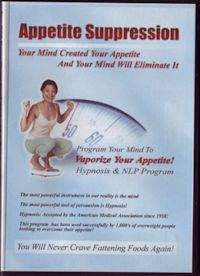
|
|
Medical Research AndWeight Loss Hypnosis For Success
Click here to email this
page to a friend.
|
||
|
But researchers have also proven that almost no one can stick to any diet because of his or her appetite. So to be successful with a diet, weight loss requires appetite suppression. Webster's Dictionary defines "Appetite" as: "The desire for gratification of some want, craving, or passion." So "appetite" is eating and drinking for relaxation and pleasure. Many people confuse appetite with hunger. Hunger is defined as "The body's call for nourishment." In other words, when the body needs sustenance, that's when you feel genuine hunger. By that differentiation, it is almost impossible for a person who is overweight to "be hungry." However, it is possible for you to have feelings that you interpret as "hunger." And the stomach contracting in expectation of being fed causes those feelings. When you were an infant in a cranky mood, mom would give you a bottle of warm milk to calm you down. The bottle would distract you and calm you, and often you�d fall asleep. That sequence of events was repeated hundreds of times, so that at the unconscious level of mind, putting something into your mouth was be paired with relaxation. That pairing created what is know as a conditioned response. Because of that conditioning, now that you are an adult, when you become stressed or nervous, you experience oral cravings. And when you put something into your mouth, you become more relaxed. People Also Get Cravings and Urges Because Of Conditioning. Similarly, when you associate consuming food with an environment or an activity, after a few repetitions it creates a conditioned response. A good example would be if you eat when you watch TV. After a few repetitions, when you sit down to watch TV, you feel an urge to eat. What About Compulsive Overeaters Who Eat Because Of Emotional Reasons? We define a compulsion as an "irresistible impulse." One of the presuppositions of NLP is: All behaviors are driven by a positive intention. In other words, our mind only motivates behaviors that benefit or protect us in some way. So in NLP terms, being fat is a behavior when it provides a positive outcome for us. You must be wondering what the possible positive outcomes of being fat could possibly be. The list is as long as the list of people who have an appetite that is out of control. But I'll give you a classic example: A person gets their heart broken in a relationship. So to protect the self from getting the heart broken again, the unconscious motivates the self to become fat to keep the self out of relationships and prevent another broken heart. A big secret to suppressing your appetite is called reframing. With an NLP six-step weight loss reframe, we respect the fact that the unconscious is pushing us to consume extra food for relaxation and pleasure. And if we are eating compulsively because being fat is protecting us, we respect that also. In an NLP reframe we compromise with our subconscious mind. In the scenario of eating for relaxation and pleasure, we ask our subconscious to assume the responsibility for substituting some other behaviors. The alternate behaviors must be as effective and available at providing the same relaxation and pleasure. But they must also be more acceptable to us on a conscious level. When the unconscious is motivating us into alternate behaviors that provide the relaxation and pleasure that we require - we lose our appetite on this score. If you are an emotional eater we do an additional reframe. We ask your unconscious mind to assume responsibility for finding new behaviors in place of being overweight. These new behaviors must be as effective and available at providing the same positive outcomes. But they must be behaviors that are more consciously acceptable to you. When your subconscious mind is motivating you into alternate behaviors that provide the same protections that you require, you lose the urge to overeat. As far as feeling cravings because of conditioning (conditioned responses), we utilize various NLP and hypnotic techniques that erase those conditioned responses. That breaks the connection between the behaviors, and dissolves the urges and feelings of compulsion. As soon as your appetite has been eliminated and any compulsion to overeat has been dealt with, you can easily stick to any diet that you chose on an indefinite basis so that it becomes a permanent lifestyle change. Compulsive overeating and appetite suppression is a complex topic. I can only broach the surface of it in this article. You can read several additional articles on this topic on my website.
� 2007 By Alan B. Densky. This document may NOT be re-printed. All Rights Reserved. Alan B. Densky, CH opened his practice since 1978. He specializes in the use of Ericksonian hypnosis & NLP for losing weight, and Video NLP/hypnosis for appetite control. He also provides a broad range of hypnosis & NLP CD's for a broad range of other topics and can be reached through his hypnotherapy website.
|
|||

